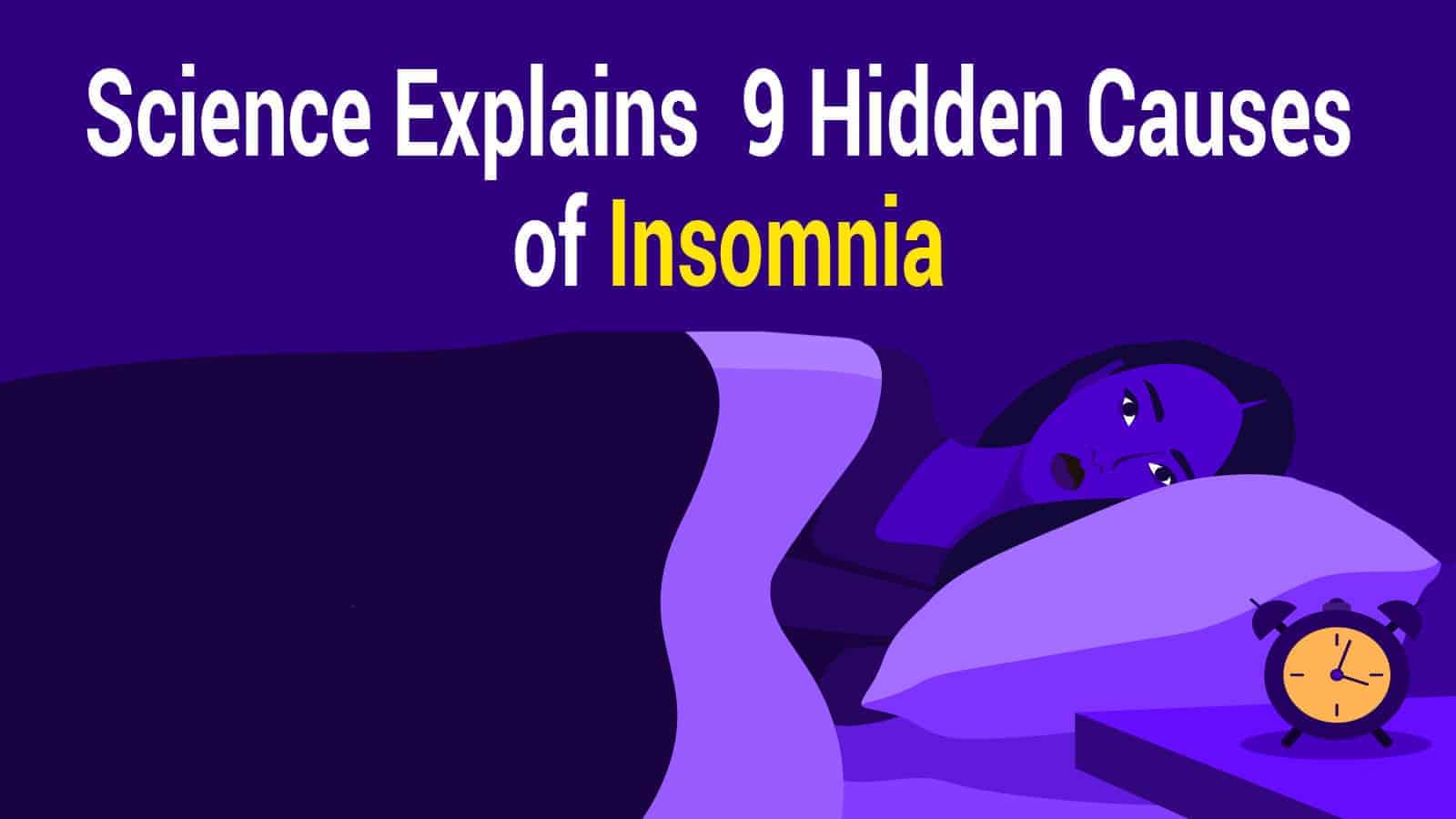If you do not get enough sleep, your life may become unbearable. Unfortunately, insomnia is a very common problem that affects almost everybody at some point in their lives. Some people experience short-term insomnia, while others develop a chronic condition that makes their entire world unbearable.
It can be daunting as you try to solve your sleep problems on your own. You could have tried various natural and artificial remedies that may or may not work for you. The process of trying to ease insomnia can be very frustrating at times.
There is a link between mental health and sleep. Insomnia can adversely affect your mental health. Likewise, having a mental health problem can negatively affect your sleep pattern.
Lack of adequate sleep also interferes with the body in various ways. For instance, it adversely affects the body’s daily metabolic repairs, hence affecting the body’s stress adaptation centers. This also reduces the effectiveness of your body’s immune system.
The Hidden Causes of Insomnia
Below are some hidden causes if insomnia and how you can fix them to enable you to sleep well.
1 – Inadequate Exposure to Sunlight Can Cause Insomnia
Natural light plays a very vital role in promoting health. Every year, we discover new benefits of sunlight to our health. In addition to helping make vitamin D and lighting the world, the sun regulates our sleep cycle.
When you get sunlight early in the morning every day, your body will understand the difference between night and day. As a result, your brain will effectively regulate sleep hormones to help you feel tired and fall asleep at night. Therefore, sunlight influences consistent and restful sleep which comes naturally during the night.
On the other hand, if you do not have proper sunlight exposure, you risk developing insomnia. Ensure that you get the sunlight after waking up and during the day to help you regulate your sleep cycle.
Moreover, turn off electronics (including phones) and other artificial lights at least an hour before you sleep. They tend to trick the brain into thinking that it is still daytime, making you stay awake for long.
2 – Ever-Increasing Bodyweight
Additional bodyweight is highly likely to negatively affect your sleep cycle. Overweight and obese people are at risks of having sleep apnea. Sleep apnea is a health condition in which one’s interrupted breathing at night disrupts his or her sleep.
Furthermore, if you are overweight, you are more likely to have poor blood sugar regulation and hormonal balance. As a result, you may have frequent massive cortisol spikes after your meals. This becomes a huge issue if it occurs dinner time since cortisol is a stimulant.
Hence, you should work at reducing your body’s weight or maintaining the recommended body mass index. You should also take a small amount of low glycemic carbohydrates and a lot of healthy fats.
3 – Having a Damaged Gut
Did you know that the gut has much higher concentrations of melatonin, the sleep hormone, than the brain has?
Most people think that the gut only performs the food digestion and absorption functions. Science reveals that the gut plays a crucial role in your body, having a complex relationship with the brain.
For instance, the gut has about 30 different neurotransmitters that significantly influence your mood, thinking, and sleep among other actions. Many people having chronic sleep problems have damaged guts. If you optimize your gut’s health, you are likely to prevent insomnia and promote your brain health.
What to look into in your gut:
- Presence of pathogens (dysbiosis, parasites, viruses)
- Food sensitivities
- Leaky gut
4 – Sleeping in the Wrong Environment
You should optimize your bedroom to help you get an optimal seep. You should address various factors in your bedroom for it to create a good sleeping environment.
Bedroom for Relaxing
One of the most powerful things to do is to only use your bedroom for intimacy and sleep. This sets your brain that every time you go to the bedroom, you are going for sleep or intimacy. When you constantly argue or bring work into your bedroom, your brain will have difficulties allowing you to relax.
Avoiding Artificial Lights in the Bedroom
If possible, your bedroom should be in position that allows it to receive adequate natural light throughout the day. You should avoid using artificial lights in your bedroom. If possible, keep off alarm clocks, lamps, phones, and any other thing that emits artificial light from your bedroom. If you need light at night, you may consider purchasing amber or orange light bulbs for your bedrooms. You can also use candlelight or salt lamp. You may also wear light-blocking glasses
Maintaining Optimal Bedroom Temperatures
You should maintain your bedroom temperatures at between 60 and 68 degrees during the night. Optimal temperatures are perfect for relaxing and influence sleep. Notably, your body temperature tends to drops naturally in the evening. Therefore, if you lower your bedroom temperature too, you will be supporting this natural body cycle, making you sleep soundly. If you can control it, do not hesitate to do so.
5 – Not Making Quality Sleep a Priority Can Cause Insomnia
In this digital generation where relations are built on social media, never assume that only unsocial people sleep 8-hours-a-day. You too need a night of quality sleep.
If you get a solid rest every night, your mental acuity and energy will be boosted. As a result, various aspects of your life will be improved, including your social life. You need to be rational at identifying behaviors makes you stay late at night as they may affect your health.
6 – Physical Tension
Any kind of body stressor sends a signal to your brain, telling it that things are not safe. As a result, the brain would not consider sleep as an appropriate response.
Muscle tension sends a similar stress signal to that of avoiding a predator. You may feel more relaxed when you get a massage or stretch. These activities help you lower anxiety and cortisol.
Try one of these strategies to soothe away tense muscles and relieve stress:
- Loosen up
- Bathe with Epsom salts
- Apply essential oils
7 – Low Gamma-Aminobutyric Acid (GABA) Levels
GABA is an inhibitory neurotransmitter which helps put brakes on your brain. When you have low GABA Levels, you are likely to suffer from insomnia.
Factors that inhibit the production of GABA include:
- Blood sugar problems
- Gut Dysbiosis
- Chronic stress
- Mineral deficiencies, such as zinc, magnesium
- Vitamin B6 deficiency
- Glutamine deficiency
- Taurine deficiency
Interestingly, insomnia also causes low GABA levels
In order to improve GABA levels, you can embrace the following:
Follow lifestyle strategies to adapt to stress:
- Prioritize sleep
- Consume fermented foods to improve microbiome
- Take Epsom salt bath with essential oils
- Focus on deep breathing
- Undertake regular exercise
- Adopt an anti-inflammatory diet
 8 – Adrenal Dysfunction
8 – Adrenal Dysfunction
This condition is linked to several different body processes. However, it is usually overlooked as one major cause of insomnia.
It is worth noting that the adrenal glands secrete the stimulatory hormone cortisol. In an ideal situation, you should have a spike in cortisol when you wake up in the morning. It gradually declines until you have a spike in melatonin in the evening as you go to your bed. Adrenal dysfunction is likely to be experienced by those who have adrenal issues. They end to experience a spike of cortisol during the night, interfering with their sleep.
In addition to that, those who suffer from adrenal fatigue experience blood sugar problems. This is a concern—when your blood sugar level drops during the night, cortisol spikes before you go to bed. In case you notice that you do wake up at 2 am or 3 am, you may be having blood sugar problems.
9 – Not Unwinding Properly
You obviously know that stress in your bedroom will rob you of your sleep. In this fast-paced society, most people are often wound up and find it hard to unwind. If you always find your mind racing while you lie in bed at night, here are some remedies for you.
Make an effort of unwinding before you retire to bed. You can make a routine whereby you stop working at the same time each night. This will allow you to spend some time relieving your body off stress and making it relaxed.
You may opt to listen to some slow, relaxing music, meditating, doing a light stretch, or praying. You may also adopt gratitude journaling or diffuse some lavender oil in your bedroom. Other people free the body from a stressful state by spending quality time with their families.
It is worth noting that when you go to bed with unresolved conflicts, you are highly unlikely to sleep early. Talk to your partner and go to bed knowing that the issue has been resolved. One hack is to avoid arguing in the bedroom—the bedroom is for intimacy and relaxation.
Final Thoughts on Coping with Insomnia
Sleep is one of the most important activities in your life. You require adequate sleep is required for optimum health. No matter the struggles you go through during the day or through your interactions, let them not overwhelm you. Insomnia is ugly!
The good news is that science has gotten your back. It reveals the deeper or hidden issues that cause your insomnia. Experts also offer qualified solutions to restless nights. If you believe that you have everything all set but you still cannot seem to have a peaceful night, consider consulting your doctor.


















